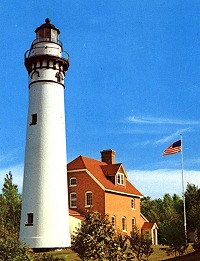Outer Island Light facts for kids
 |
|
|
|
|
| Location | Wisconsin |
|---|---|
| Coordinates | 47°04′35.5″N 90°25′00.11″W / 47.076528°N 90.4166972°W |
| Year first lit | 1874 |
| Automated | 1961 |
| Foundation | Stone |
| Construction | Brick with Italianate bracketing |
| Tower shape | Frustum of a cone with attached brownstone keeper's house |
| Markings / pattern | White with black trim and lantern |
| Height | 90 feet (27 m) |
| Focal height | 130 feet (40 m) |
| Original lens | Third-order Fresnel lens |
| Current lens | solar powered Vega VRB-25 |
| Range | 12 nautical miles (22 km; 14 mi) |
| Characteristic | White, flashing, 10 sec |
| ARLHS number | USA-572 |
| USCG number | 7-15255 |
The Outer Island Lighthouse is a historic lighthouse found on the northern tip of Outer Island. This island is one of the many Apostle Islands located in Lake Superior. You can find it in Ashland County, Wisconsin, close to the city of Bayfield.
This important light was designed by Orlando Metcalfe Poe, a chief engineer for the United States Lighthouse Board. His successor, Godfrey Weitzel, oversaw its construction. The lighthouse first shone its light in 1874.
Today, the National Park Service owns the Outer Island Lighthouse. It is part of the Apostle Islands National Lakeshore. Because of its history, it was added to the National Register of Historic Places in 1977. The lighthouse building is connected to a two-story house where the lighthouse keepers used to live.
Visiting the Outer Island Lighthouse
Many of the lighthouses in the Apostle Islands are open for visitors. You can usually reach them by water taxi or private boat during the summer months. The Apostle Islands Cruise Service offers these trips.
There is also a special event called the Annual Apostle Island Lighthouse Celebration. During this time, ferry tours are available to see all the lighthouses. When you visit, you might even meet volunteer park rangers. They are often on the islands to welcome visitors and share information.
Protecting the Lighthouse from Erosion
The land around the Outer Island Lighthouse has always faced a challenge: erosion. Erosion happens when natural forces like wind and water wear away the land. Since the lighthouse was built, the bluff (a steep cliff) it sits on has been slowly eroding.
To protect this historic site, the National Park Service started a big project in 2004 and 2005. They used a three-part plan to stop the land from washing away. First, they built a strong stone wall at the bottom of the cliff. This wall helps to armor the base against waves and water.
Second, they improved the drainage system on the top of the grounds. This stops rainwater from running off and digging into the clay bank. Finally, they planned to use "bio-engineering." This means planting special plants and trees to help hold the soil in place. While they finished the wall and drainage, they could only plant some of the most important areas due to limited funds.
 | Laphonza Butler |
 | Daisy Bates |
 | Elizabeth Piper Ensley |


